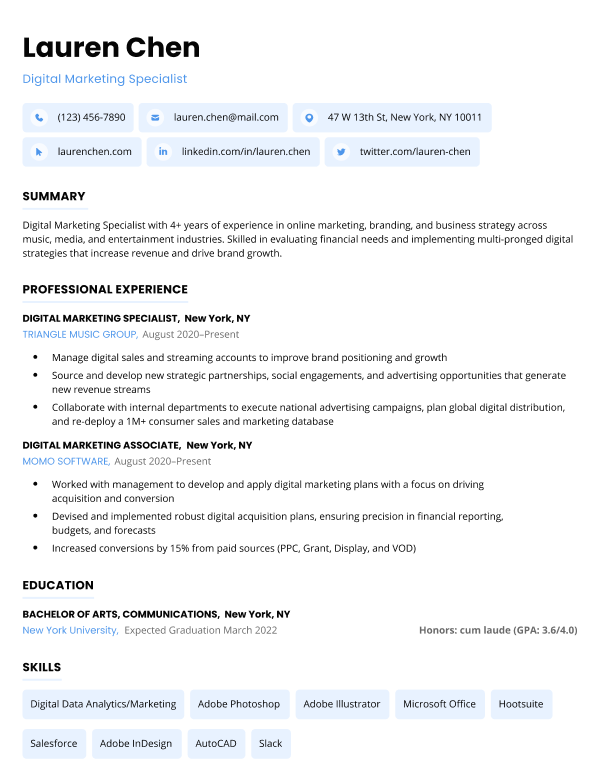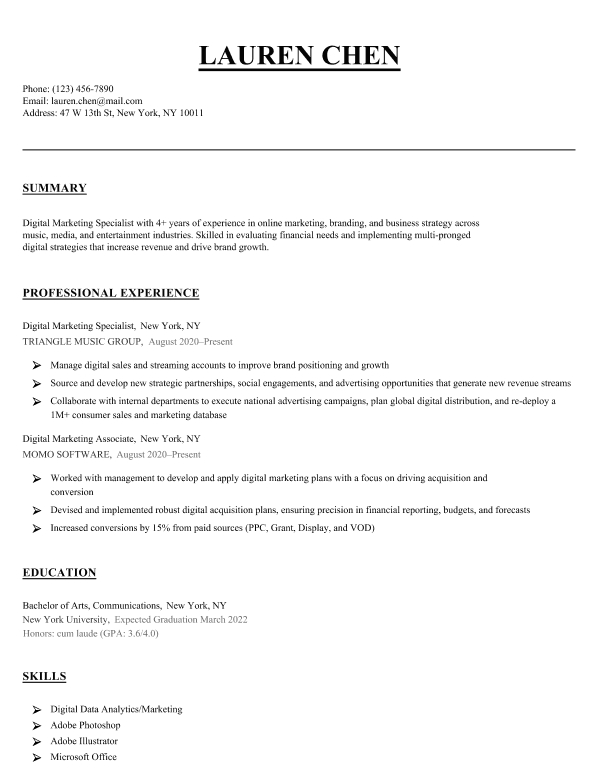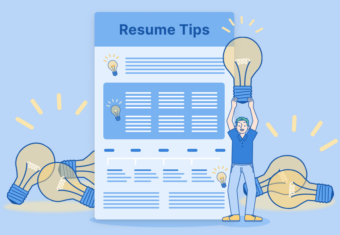Scroll down to view our full list of job-related interests and hobbies, as well as tips for where, when, and how to list them on your resume.
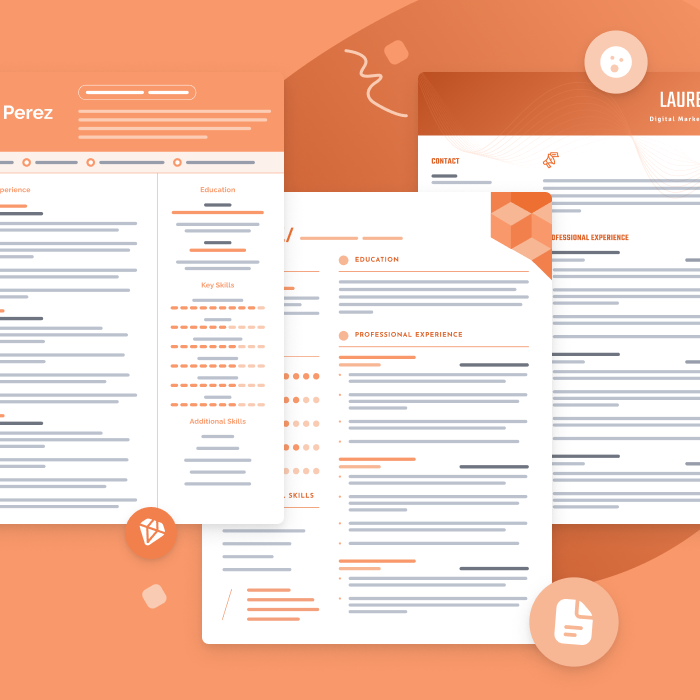
The best resume templates for 2024
One of the best ways to make your resume is by filling out one of our free resume templates. All our templates are designed by experts and free to download for Microsoft Word or Google Docs.
Should you put your hobbies and interests on a resume?
Yes, you should put your hobbies and interests on a resume if you lack work experience and want to give employers a better idea of what you’re like outside of work (which often gives some insight into what you’d be like in the office).
Interests and hobbies help show that you’re a well-rounded applicant, and in many cases demonstrate important hard and soft skills.
Hard skills are gained from practical experience, training, or education.
For example, including chess as a hobby shows hiring managers you’re comfortable with strategy and can stay focused on challenging tasks.
Soft skills describe your ability to relate to others in a professional setting.
For instance, being part of an amateur football league shows you’re dedicated and capable of working with a team.
However, if you already have a few years of work experience and can fill a one page resume with relevant professional skills and qualifications, don’t put hobbies and interests on your resume.
Always fill your resume with the appropriate resume sections first before adding your interests and hobbies so hiring managers can see if you’ve met their essential job requirements.
Here are more examples of when you should and shouldn’t add your hobbies and interests to your resume:
Include your interests or hobbies if:
- they relate to the company or position
- your education and work experience don’t fill a one page resume
- they allow you to showcase skills relevant to the role
- the organization asks you to include this information
- you know the company values personalized applications
Don't include your hobbies or interests if they:
- hint at antisocial or isolating behavior
- may be considered dangerous or violent
- conflict with a company’s culture or values
- may be seen as inappropriate or discriminatory
- reveal personal information such as political or religious connections
Our free-to-use resume builder can make you a resume in as little as 5 minutes. Just pick the template you want, and our software will format everything for you.
40+ job-relevant hobbies and interests for your resume
Once you’re confident that putting hobbies and interests on your resume will help your application, the next step is choosing the right examples to list.
To help you get started, here are 40+ professional interests and examples to put on your resume that reflect positively on you as a candidate.
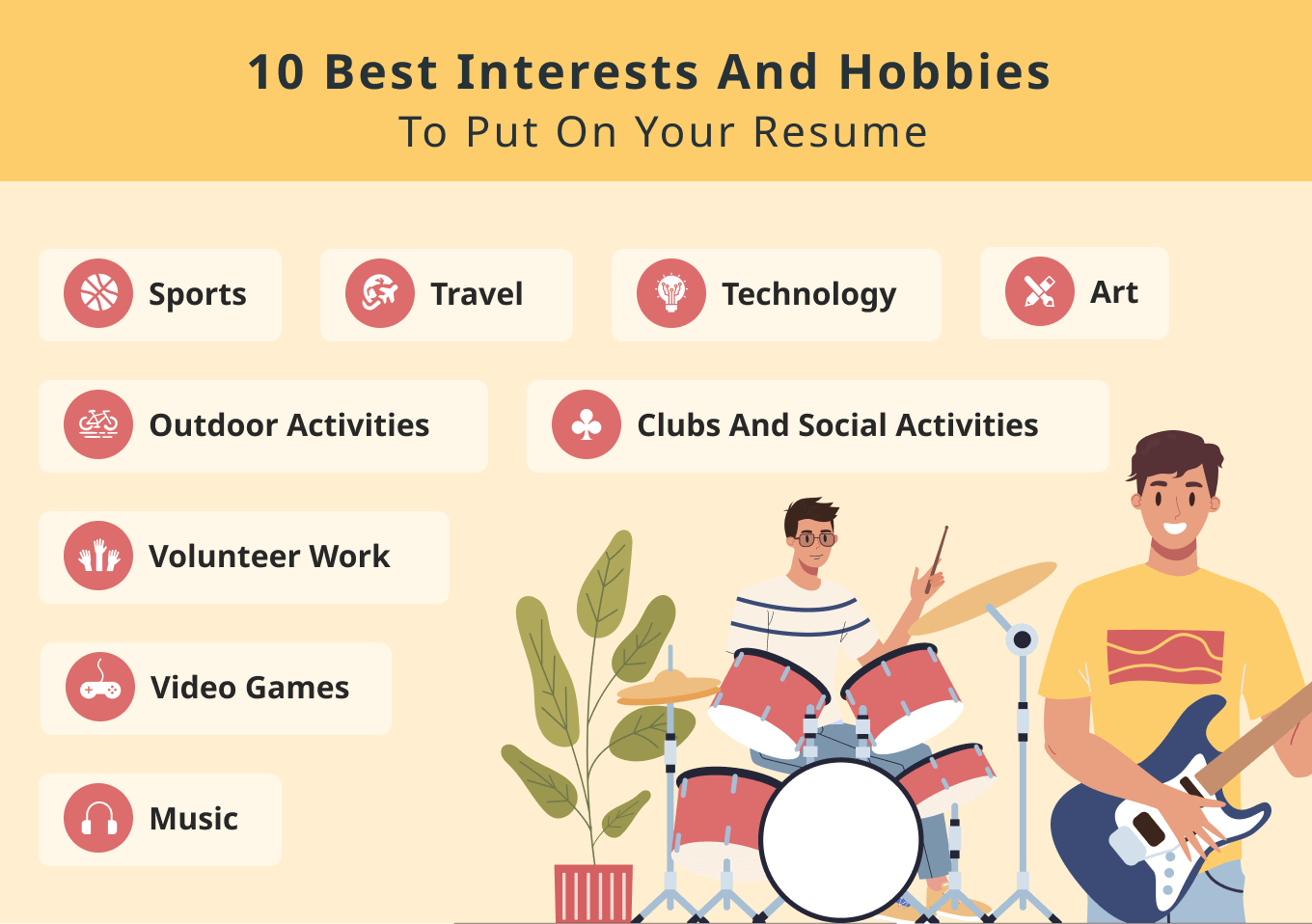
1. Sports
Playing a sport is one of the best hobbies for your resume because it shows you’re energetic and healthy.
For example, a solo sport like jogging conveys that you’re self-motivated and disciplined. And with group sports, you communicate to employers that you’re capable of working with a team.
Additionally, being the captain of an amateur sports team demonstrates leadership skills and interpersonal skills — which are highly valuable in any professional setting.
These are good sports activities for your resume:
- Baseball
- Basketball
- Cycling
- Football
- Jogging
- Marathon running
- Martial arts
- Running
- Soccer
- Swimming
- Tennis
- Weight lifting
- Volleyball
- Yoga
2. Outdoor activities
Putting outdoor activities like hiking or camping on your resume is a great way to show employers that you lead a balanced life and stay healthy.
Not only that, but getting into nature in your spare time is helpful for mental health and avoiding burnout at work.
These are some outdoor activities to put on your resume:
- Camping
- Fishing
- Gardening
- Hiking
- Mountain climbing
- Trekking
3. Technology-related activities
Companies are working remotely more than ever. So interests related to technology show employers you’re an excellent communicator and up-to-date with current software.
For instance, if you maintain a personal blog, podcast, or Youtube channel, mentioning it on your resume is a great way to highlight your creativity, organizational skills, and technical skills. Blogging and vlogging are especially relevant to jobs in marketing or advertising.
However, only mention these interests if your media is work appropriate.
Here are other technology-related interests for your resume:
- Coding
- Content creation
- Fixing or troubleshooting computers
- Photo and video editing
- Podcasting
- Writing
4. Art
An interest in art tells the hiring manager that you’re creative and have a keen eye for detail.
Artistic interests are especially good to put on your resume if you want to work in a creative or design-focused field, like UX/UI, cinematography, or art curation.
Some examples of artistic hobbies to put on your resume include:
- Dance
- Drawing
- Graphic design
- Painting
- Pottery
- Photography
- Sculpting
- Sewing and making clothes
- Woodworking
5. Volunteer work
Putting volunteer work on your resume is a great way to showcase your community engagement, generosity, and time management skills.
If you’re applying for a role at a not-for-profit organization or a company that values social responsibility, volunteer experience is a great addition to your resume.
6. Travel
If you list travel as one of your hobbies and interests, you communicate to employers that you’re open-minded, adventurous, and tolerant.
Travel is a good interest to include on your resume if you’re applying for jobs that require you to:
- travel internationally
- have knowledge of different cultures and business customs
- involve working within a multicultural team
7. Foreign languages
Including foreign language skills on your resume shows dedication, initiative, and communication skills.
An interest in learning foreign languages is especially beneficial if you’re applying for jobs that involve international travel, multinational sales, or tourism.
8. Video games
Recently, many employers recognize that playing video games demonstrates problem solving skills and shows you can meet objectives.
Also, creating video game tournaments or establishing games with set rules further highlight your leadership and organizational skills.
However, you should still be mindful of the job you’re applying to before listing your interest in video games anywhere on your application.
For example, if you’re applying for a role in the tech industry, listing gaming as a personal interest is likely to get a positive response — especially if you understand how cross-platform games or peer-to-peer connections work. Such knowledge may even be relevant to the position.
However, mentioning your interest in gaming when applying to a law firm can appear unprofessional.
9. Music-related activities
Playing or creating music requires self-discipline and commitment. Additionally, being a member of a band requires collaboration and people skills.
Adding music as a hobby on your resume is a safe choice for any industry, and demonstrates a variety of valuable soft skills such as confidence, openness to feedback, and patience.
Some specific musical interests for your resume include:
- Beatboxing
- Guitar
- Piano
- Music composition
- Singing
- Songwriting
- Trumpet
10. Club or social-related activities
Being part of a social club or association shows hiring managers that you’re an active member in your community and enjoy being around others.
Listing your membership in a local sports, social, or academic club as an interest on your resume is a great way to highlight your interpersonal skills to potential employers.
Also, adding a fraternity or sorority on your resume is a great choice if you’re applying to any people-focused role, such as a customer service representative or team lead.
Have a look at more club or social activities for your resume:
- Board games
- Local meetups
- Networking events
- Public speaking
How to list interests and hobbies on a resume
Now that you’ve got a shortlist of extracurricular activities for your resume, you’ll need to list them properly.
Our in-house career advisor Eva gives you tips on how you can accurately list your interests and hobbies on your resume:
To expand upon Eva’s advice, here are three steps to help you with the writing process:
1. Create an interests and hobbies section on your resume
Whether you’re creating your resume manually or using a resume maker, consider adding a dedicated section titled “Interests & Hobbies” or “Personal Interests.”
Adding your interests and hobbies in a separate section makes it easy for employers to separate them from the work experience on your resume.
Then, list 3–5 interests or hobbies in a bulleted list, similar to how you’d format your resume’s skills section.
Here’s an example of what a interests and hobbies section looks like:
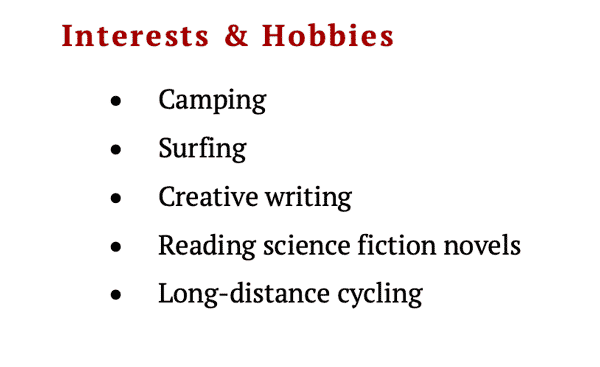
If you lack work experience, consider making your resume interests section more detailed. For instance, you can include a brief one-line description for each interest that explains what you do or how it relates to the role.
If possible, quantify each point by adding hard numbers such as percentages or time.
These short descriptions can make up for a lack of professional experience because they showcase some of your best achievements even though they were outside an office setting.
Here’s an example of a detailed resume interests section:
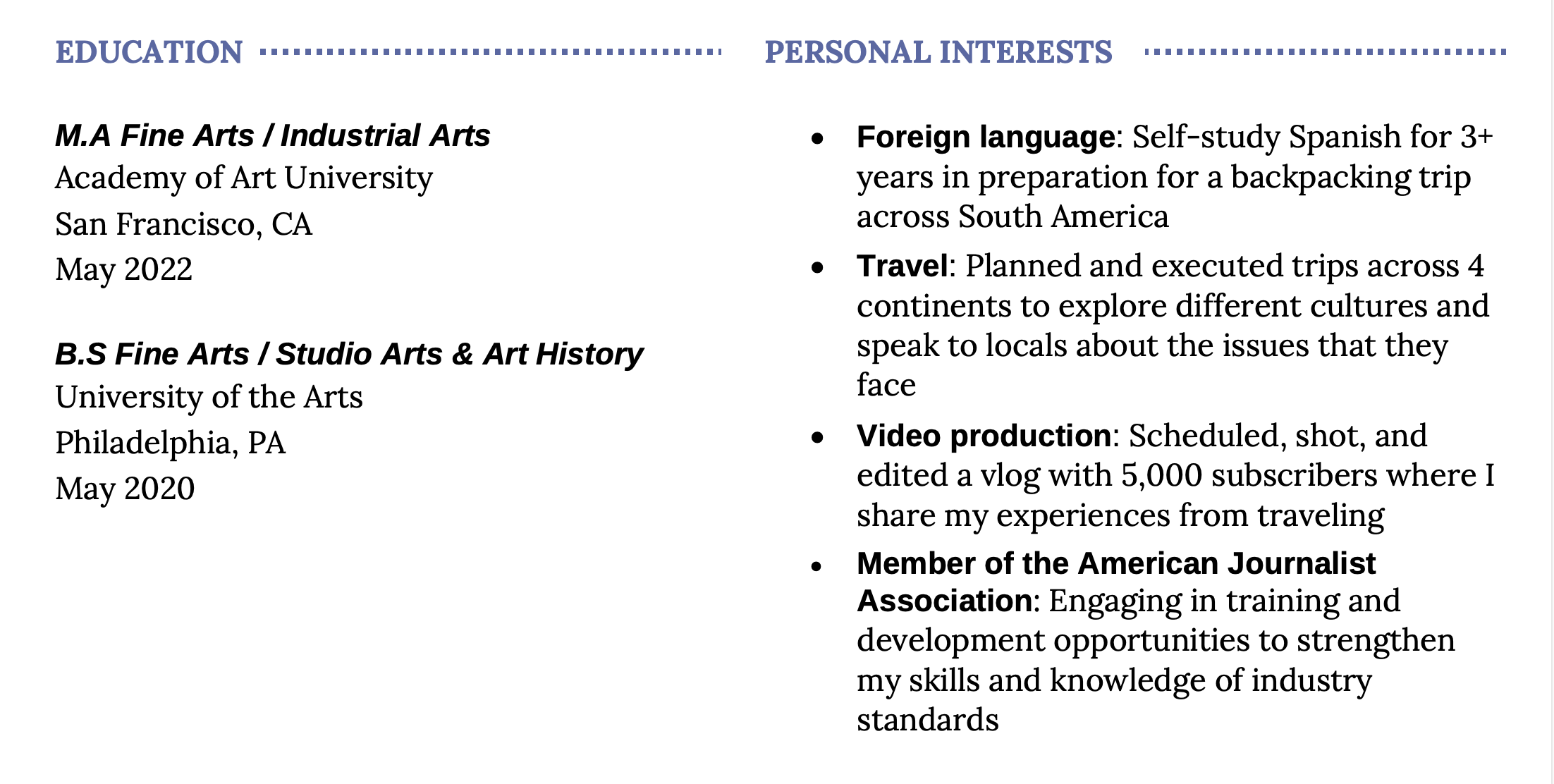
2. List interests at the bottom of your resume
Place your interests section at the bottom of your resume or off to the side (depending on your resume layout).
While listing interests on your resume can make you look more appealing as a candidate, they are ultimately the least important information to include.
Listing such information at the bottom of the page helps you avoid distracting employers from the more essential information on your resume, like your educational background, work experience, accomplishments, and top skills.
3. Tailor your interests list to the job advertisement
Before you start putting interests on your resume, make sure that they’ll be well-received by the company you want to work for and show you’re a good cultural fit.
Follow these steps to keep your hobbies and interests relevant:
How to tailor your hobbies and interests to a company
- Do some research on the company by looking at its website or social media profiles.
- Take note of anything you can find out about its office culture, or what kind of work retreats or team building outings they’ve done in the past. These details can provide more insight on the types of activities the company values and what its current employees are interested in.
- Once you’ve learned more about the company culture, tailor your resume interests section to highlight the interests or hobbies that are the most relevant to that specific office.
For example, if you’re applying to an organization that recently brought its team on a company-sponsored hike, try listing outdoor activities like hiking or camping on your resume to make a good first impression and show them that you’d fit in well with the company.
Click to rate this article
4.3 Average rating



